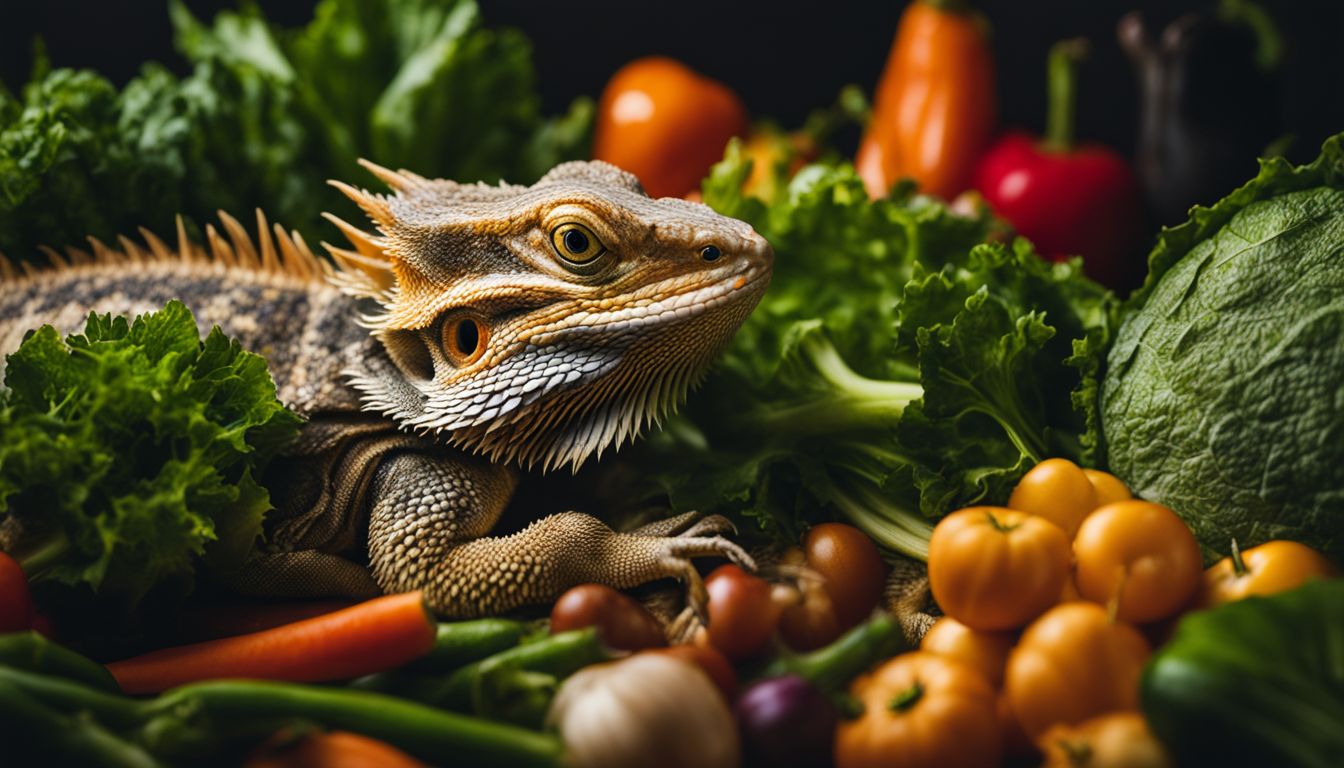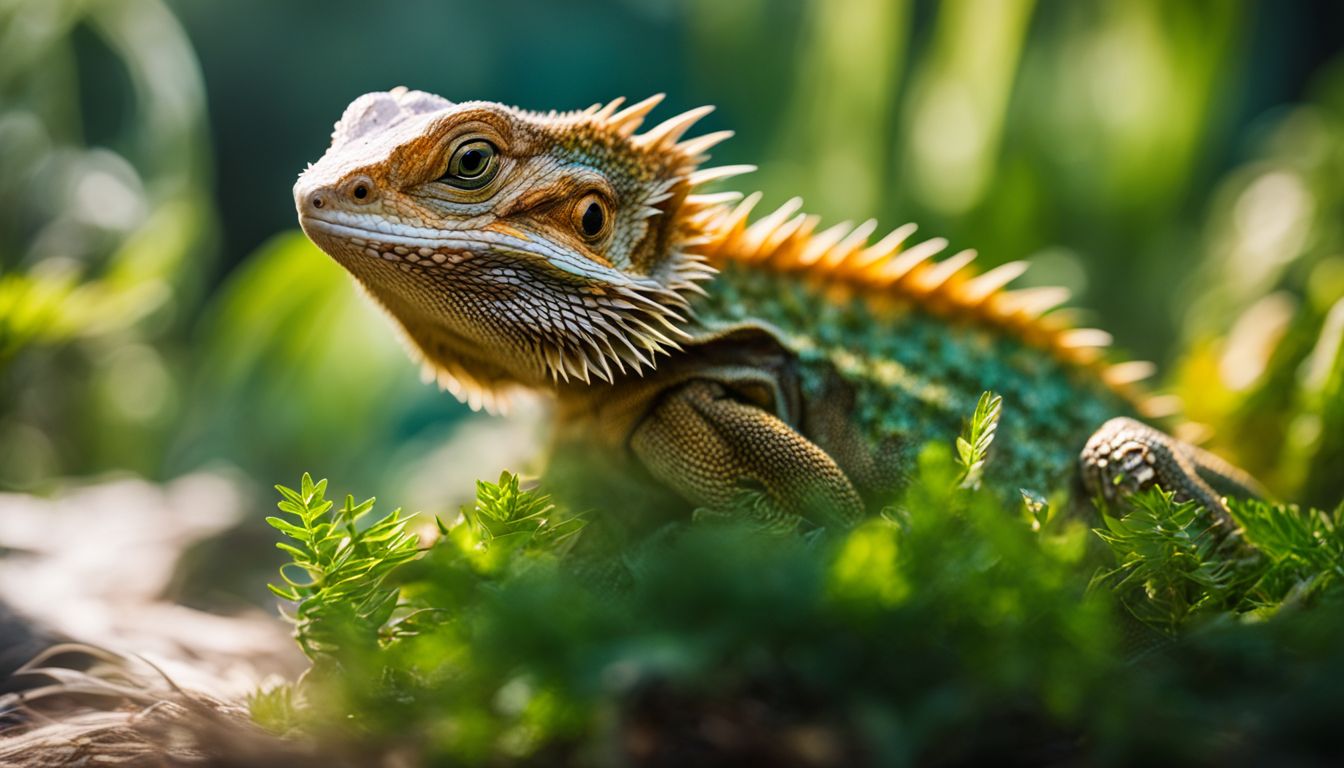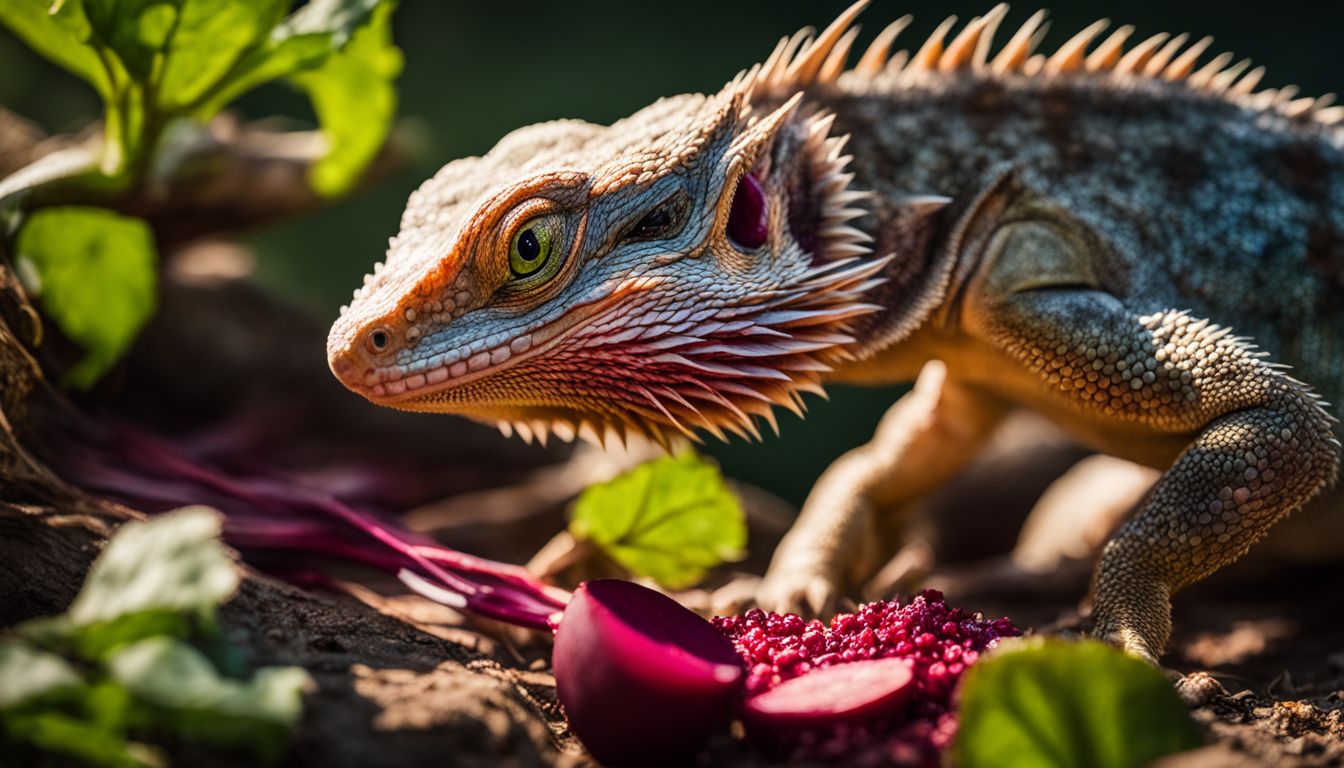Deciding what to feed your bearded dragon can sometimes feel like a puzzle. One interesting piece of that puzzle is beetroot. Beetroot, in small amounts, can be part of their diet.
This article will guide you through the do’s and don’ts of feeding beetroot to your scaly friend. Keep reading for some helpful insights!
Can Bearded Dragons Eat Beetroot?

Beetroot can be potentially harmful to bearded dragons due to its high oxalate content, which can bind calcium and lead to metabolic issues. Understanding the risks associated with feeding beets to these reptiles is crucial for their overall health and well-being.
Nutritional Information
Beetroot, packed with essential nutrients, offers a powerhouse of benefits not just for humans but potentially for our scaly friends as well. Diving into the specifics, here’s a breakdown of what this vibrant vegetable contains, serving as a potential dietary option for bearded dragons.
| Nutrient | Value per 100g |
|---|---|
| Fiber | 2.8g |
| Folate (Vitamin B9) | 109µg |
| Manganese | 0.329mg |
| Potassium | 325mg |
| Iron | 0.8mg |
| Vitamin C | 4.9mg |
This table highlights beetroot’s rich array of nutrients. Each plays a crucial role in maintaining a healthy bearded dragon. Fiber, for instance, is vital for digestive health. Folate, or Vitamin B9, contributes to DNA synthesis and repair, which is critical for all living beings. Manganese plays a part in the metabolism of amino acids, cholesterol, glucose, and carbohydrates. Potassium is essential for nerve function and muscle health. Iron helps in the formation of red blood cells, and Vitamin C is a powerful antioxidant that supports the immune system.
Given bearded dragons are omnivores, their diet requires a balance. The combination of calcium and phosphorus, crucial for bone health, needs careful consideration. Beetroot’s nutritional profile can complement their requirements when included in moderation. It’s all about providing a varied diet that mirrors the nutritional diversity they would encounter in their natural habitat.
Risks of Feeding Bearded Dragons Beets
Bearded dragons can eat beetroot, but it’s not a perfect food choice for them. Let’s dive into some concerns you should be aware of before adding beets to their diet.
- High Oxalate Content – Beets contain oxalates, which can bind with calcium in the dragon’s body. This binding process makes it hard for them to absorb this essential nutrient, potentially leading to calcium deficiency.
- Improper Calcium to Phosphorus Ratio – A balanced diet requires a correct calcium to phosphorus ratio. Unfortunately, beetroot has more phosphorus than calcium, disrupting this balance and may cause health problems over time.
- Digestive Issues – Due to their high fiber content, beets might lead to digestive discomfort or even blockages in small or young bearded dragons whose digestive systems are not fully developed.
- Limited Nutritional Benefit – While they do offer some vitamins and minerals, the risks often outweigh the benefits due to the high oxalate content and imbalanced nutrient ratios prevalent in beets.
- Risk of Overconsumption of Vitamin A – Beet greens are high in vitamin A which is good in moderation but can become toxic if fed too frequently or in large amounts.
- Potential for Picky Eating Habits – Just like us, bearded dragons can develop preferences for certain foods over others. Introducing too many sweet veggies like beetroot might make them picky eaters who refuse more nutritious options.
- Color Changes in Waste – A less concerning but notable point is that consuming beetroot could change the color of your dragon’s waste, potentially alarming unsuspecting owners.
The Impact of Oxalates in Beetroot on Bearded Dragons

Beetroot packs a high oxalate punch, much like spinach. These oxalates pose a real risk to bearded dragons, affecting their calcium metabolism. Without enough calcium, your bearded dragon might face serious health issues.
They can develop kidney stones or experience joint pain—problems no pet owner wants for their reptilian friend.
Oxalates in beetroot and its greens interfere with how calcium is used in a bearded dragon’s body, leading to potential chronic diseases. Veterinarians warn against feeding foods high in these compounds due to the risk of oxalate toxicity.
Now, let’s talk about whether it’s safe for bearded dragons to eat beet greens.
Can Bearded Dragons Eat Beet Greens?
Yes, bearded dragons can eat beet greens. Beet greens are high in nutrients like vitamins A and C, calcium, iron, and magnesium that can benefit your pet. However, due to their oxalate content, it’s important to offer beet greens sparingly as part of a varied diet for your bearded dragon.
Moderation is key when feeding them these greens because of the potential risks associated with oxalates. As juvenile bearded dragons grow, they need fewer insects and should consume more leafy vegetables including beet greens.
Next, let’s delve into other foods to avoid for bearded dragons..
Other Foods to Avoid for Bearded Dragons
Avoid feeding your bearded dragons darkling beetles; instead, opt for a balanced diet of safe vegetables and leafy greens. Read more to ensure your pet’s health and happiness!
Can Bearded Dragons Eat Darkling Beetles??
Darkling beetles, also known as mealworms, can be fed to bearded dragons occasionally as a snack. However, it’s best not to make them a regular part of the dragon’s diet due to their low nutritional value and unbalanced calcium-phosphorus ratio.
Additionally, feeding your pet darkling beetles can become labor-intensive over time, so it’s advisable to opt for more nutritious and easily manageable food options for your bearded dragon’s overall health.
Bearded dragon owners should prioritize providing a balanced and nutrient-rich diet for their pets. Therefore, while darkling beetles are not toxic for these reptiles, they are not an ideal or sustainable dietary option and may even lead to potential nutritional deficiencies if relied upon too heavily.
Appropriate Vegetable Diet for Bearded Dragons
Beet greens, asparagus, and squash are good choices. Leafy greens such as collard greens, mustard greens, and dandelion greens provide essential nutrients for bearded dragons. Bell peppers and carrots also make a nutritious addition to their diet. Avoid feeding them avocado and citrus fruits due to their high oxalate content. Spinach should also be avoided as it can bind calcium in the body. Be mindful of the calcium to phosphorus balance when selecting vegetables for your bearded dragon.
Summary
While bearded dragons can eat beet greens, the root itself should be limited due to its high oxalate content. It’s crucial to offer a wide variety of vegetables and monitor their intake closely.
Baby bearded dragons can have beet greens once or twice a week but should also receive calcium-rich foods. Consider the nutritional benefits and risks before incorporating beetroot into their diet, always with caution and moderation.
Conclusion
In conclusion, while beet greens are a safe option for bearded dragons, the root should be given sparingly due to its high oxalate content. Feeding them beetroot occasionally in small amounts can add variety to their diet.
It’s crucial to monitor their intake and provide a balanced array of vegetables for optimal nutrition. Always consider your bearded dragon’s preferences and consult with a reptile veterinarian for tailored dietary advice.
Find out more about whether bearded dragons can eat darkling beetles in our detailed guide.
FAQs
1. Can bearded dragons eat beetroot?
Bearded dragons can eat beetroot in moderation as an occasional treat, but it should not be a regular part of their diet.
2. Is beetroot safe for bearded dragons to consume?
Yes, beetroot is safe for bearded dragons to consume in small amounts, but it should not replace their primary vegetable and insect diet.
3. How should I prepare beetroot for my bearded dragon?
Before feeding, ensure the beetroot is thoroughly washed and chopped into small, manageable pieces for your bearded dragon to eat safely.
4. Are there any potential risks associated with feeding beetroot to my bearded dragon?
Feeding too much beetroot can cause digestive issues in bearded dragons; therefore, it’s important to offer this vegetable sparingly.
5. What are the nutritional benefits of offering beetroot to my bearded dragon?
Beetroot provides essential nutrients like fiber and certain vitamins that can contribute positively to your pet’s overall health when given occasionally in appropriate portions.




